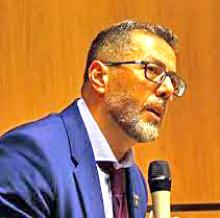You are here
America Isolated: Why some Western capitals are shifting positions on Gaza
Jun 12,2024 - Last updated at Jun 12,2024
On June 6, Spain joined South Africa’s case at the United Nations top court, accusing Israel of genocide.
This move followed a decision by Madrid and two other western European capitals — Dublin and Oslo — to recognise the state of Palestine, thus breaking ranks with a long-established US-led western policy.
As per American thinking, the recognition and the establishment of a Palestinian State should follow a negotiated settlement between Israel and Palestine, under the auspices of Washington itself.
No such negotiations have taken place in years, and the US has, in fact, shifted its policies on the issue almost entirely under the previous administration of Donald Trump. The latter had recognised as “legal”, illegal Jewish colonies in Palestine, Israel’s sovereignty over occupied East Jerusalem, among other concessions.
Several years into the Biden administration, little has been done to reverse or fundamentally alter the new status quo.
More recently, Washington has done everything in its power to support Israel’s ongoing genocide in Gaza.
Aside from supplying Israel with the needed weapons to conduct its crimes in the Strip, the US has gone as far as threatening international legal and political bodies that tried to hold Israel accountable, thus ending the “extermination” of Palestinians in Gaza, a term used on May 20 by the International Criminal Court Chief Prosecutor Karim Khan.
Washington continues to behave in such a way despite the fact that Israel refuses to concede to a single US demand or expectation regarding peace and negotiations.
Indeed, Israel’s political discourse is deeply invested in the language of genocide, while the Israeli military is actively carrying it out.
The West Bank, where the bulk of the Palestinian state would supposedly take shape, is experiencing its own upheaval. Violence there is unprecedented compared to recent decades. Across the West Bank, tens of thousands of illegal settlers are torching homes, cars and attacking Palestinians with total impunity, in fact, often alongside the Israeli army.
Yet, despite the occasional gentle reprimand and ineffectual sanctions on a few settlers, Washington continues to stand firmly by its declared policy regarding the two states and all the rest. Not a single mainstream Israeli politician, certainly not prime minister Benjamin Netanyahu and his government of extremists, is willing to entertain the very thought.
This is not surprising, as America’s foreign policy often goes against common sense. Washington, for example, fights losing wars simply because no US administration or president wants to be the one associated with failure, retreat or, worse, defeat. America’s longest war in Afghanistan is a case in point.
Due to the massive influence wielded by Israel, its allies on Capitol Hill, in the media, along with the power of lobbies and wealthy donors, Tel Aviv is clearly far more consequential to US domestic policies than Kabul. Thus, the continued US military and political support of a country that is being accused of genocide and extermination.
This reality, however, has created a political dilemma for Europe, which has often blindly followed US steps, or missteps, in the Middle East.
Historically, there have been a few exceptions to the post-WWII rule. French President Jacques Chirac defied US-imposed consensus when he strongly rejected Washington’s policies in Iraq in the lead-up to the 2003 war.
Such important, but relatively isolated fissures were eventually repaired, where the US returned to its role as the uncontested leader of the West.
Gaza, however, is becoming a major breaking point. The initial western unity in support of Israel, immediately after the October 7 events, has splintered, eventually leaving the US and, to some extent, Germany, committed to the Israeli war.
The strong, more recent stances by several western European countries accusing Israel of genocide and joining forces with countries in the Global South with the aim of holding Israel accountable, is a major shift unseen in many years.
It could be argued that the extent of Israeli crimes in Gaza has exceeded the moral threshold that some European countries could tolerate. But there is more to this.
The actual answer lies in the issue of legitimacy. Western leaders are not shying away in phrasing their language as such. In a recent piece, speaking on behalf of the “group of elders”, former president of Ireland Mary Robinson warned against the “collapse of international order”.
“We oppose any attempts to de-legitimise” the work of the ICC and ICJ, through “threats of punitive measures and sanctions”.
The Elders’ opposition, however, made no difference. On June 5, the US House of Representatives passed resolution H.R.8282 aimed at authorising sanctions on the ICC.
References to the collapse of the legitimacy of the West-established international order have also been made by many others in recent months, including by UN Secretary-General Antonio Guterres.
In his statement on requesting arrest warrants for accused Israeli war criminals, Karim Khan himself made that reference.
For some in the west, the issue is not just about the Gaza genocide. It is also about the future of the west itself.
For a long time, Washington has succeeded, at least in the eyes of its allies, in keeping the balance between the collective interests of the West and a nominal respect for international institutions.
It is now clear that the US is no longer capable of maintaining that balancing act, forcing some western countries into adopting independent political positions, the future outcomes of which shall prove consequential.
Ramzy Baroud is a journalist, author and the editor of The Palestine Chronicle. He is the author of six books. His latest book, co-edited with Ilan Pappé, is “Our Vision for Liberation: Engaged Palestinian Leaders and Intellectuals Speak Out”.His other books include “My Father was a Freedom Fighter” and “The Last Earth”. Baroud is a non-resident senior research fellow at the Centre for Islam and Global Affairs (CIGA). His website is www.ramzybaroud.net














Add new comment